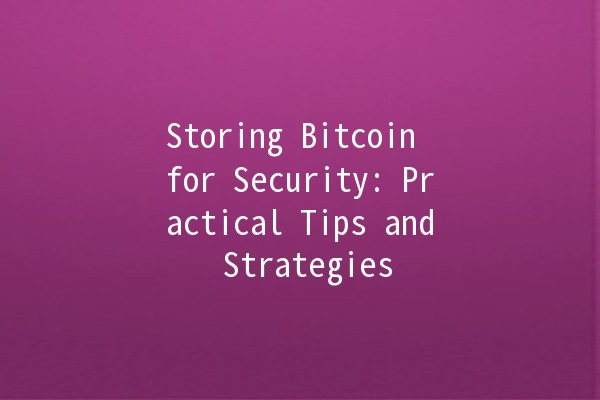




In the everevolving world of cryptocurrency, Bitcoin stands out as one of the most valuable and widely recognized digital assets. However, with its rising popularity also comes a growing concern over security. The digital nature of Bitcoin means that proper storage methods are essential to safeguard your investment from theft, loss, or unauthorized access. This article will delve into practical strategies and tips for securely storing Bitcoin, ensuring that your digital assets remain safe.
Before delving into specific tips, it’s crucial to understand the various storage options available for Bitcoin. There are primarily three types of wallets:
Understanding these options is the first step in developing a secure storage strategy.
Description: Hardware wallets are physical devices designed to securely store your Bitcoin offline.

Application: Investing in a reputable hardware wallet, such as Ledger or Trezor, can significantly enhance your Bitcoin’s security.
Example: After purchasing a hardware wallet, transfer your Bitcoin from your exchange to this device. This way, even if the exchange gets hacked, your assets remain safe on the hardware wallet. Always ensure to keep the firmware updated for added security.
Description: 2FA adds an extra layer of security by requiring two forms of identification before accessing your wallet.
Application: Most exchanges and wallet services offer 2FA options, typically through apps like Google Authenticator or SMS verification.
Example: If you enable 2FA, even if someone gains access to your password, they would still need your mobile device or secondary authentication method to access your Bitcoin wallet, making unauthorized access much more difficult.
Description: Your private key is essentially your Bitcoin password. Losing it means losing access to your Bitcoin.
Application: Store your private keys on a secure device or write them down and keep them in a safe place.
Example: Instead of saving your private key in a digital format on your computer, consider writing it on paper and storing it in a safe deposit box. This reduces the risk of online threats like malware.
Description: Backing up your wallet ensures that you can recover your funds in case of device failure or loss.
Application: Most wallet services provide options to back up your wallet. Follow the provided instructions to create a backup securely.
Example: If you use a software wallet, ensure you create a backup of your wallet.dat file and keep it in multiple secure locations, such as external USB drives or encrypted cloud storage. This way, you can recover your funds even if your device is lost or damaged.
Description: The cryptocurrency landscape is continuously changing, with new threats and technologies emerging.
Application: Regularly follow trusted news sources and updates in the cryptocurrency space to stay informed about potential risks and best practices.
Example: Joining cryptocurrency forums and following reputable figures on social media platforms can help you stay updated on the latest security practices and trends, helping to avoid common pitfalls and threats.
Use Strong Passwords: Always use complex and unique passwords for your wallets and accounts. Consider using a password manager.
Avoid Public WiFi: Never access your wallets or make transactions using public WiFi—use a secure VPN service if necessary.
Be Wary of Phishing Attacks: Guard against phishing attempts by verifying URLs and refraining from clicking on unverified links.
Diversity in Storage: Consider spreading your Bitcoin across different storage types (e.g., some in a hardware wallet, some in a software wallet) for enhanced security.
Educate Yourself: Continuously educate yourself on best practices and the latest security trends in the cryptocurrency world. Knowledge is a powerful defense.
The best way to store Bitcoin securely is by using a hardware wallet for longterm storage, combined with good practices like enabling 2FA, securing private keys, and taking regular backups.
While exchanges provide convenience for trading, keeping Bitcoin on an exchange is risky due to potential hacks. It’s advisable to move your assets to a secure wallet after trading.
If you lose access to your wallet but have a backup of your wallet.dat file or recovery phrase, you can restore your wallet using the backup on a compatible wallet application.
Storing Bitcoin on your phone is convenient, especially with mobile wallets. However, ensure you use trusted wallet apps and enable security features like biometrics or 2FA to enhance safety.
If you suspect your wallet has been compromised, immediately move your funds to a different wallet (preferably a hardware wallet) and change passwords.
Software updates often include security patches that address vulnerabilities. Keeping your wallet and system software up to date helps protect against emerging threats.
, securing your Bitcoin investment requires diligence, education, and practical steps. By implementing these strategies and staying informed about best practices, you can significantly reduce the risks associated with storing Bitcoin and enjoy peace of mind regarding your digital assets.